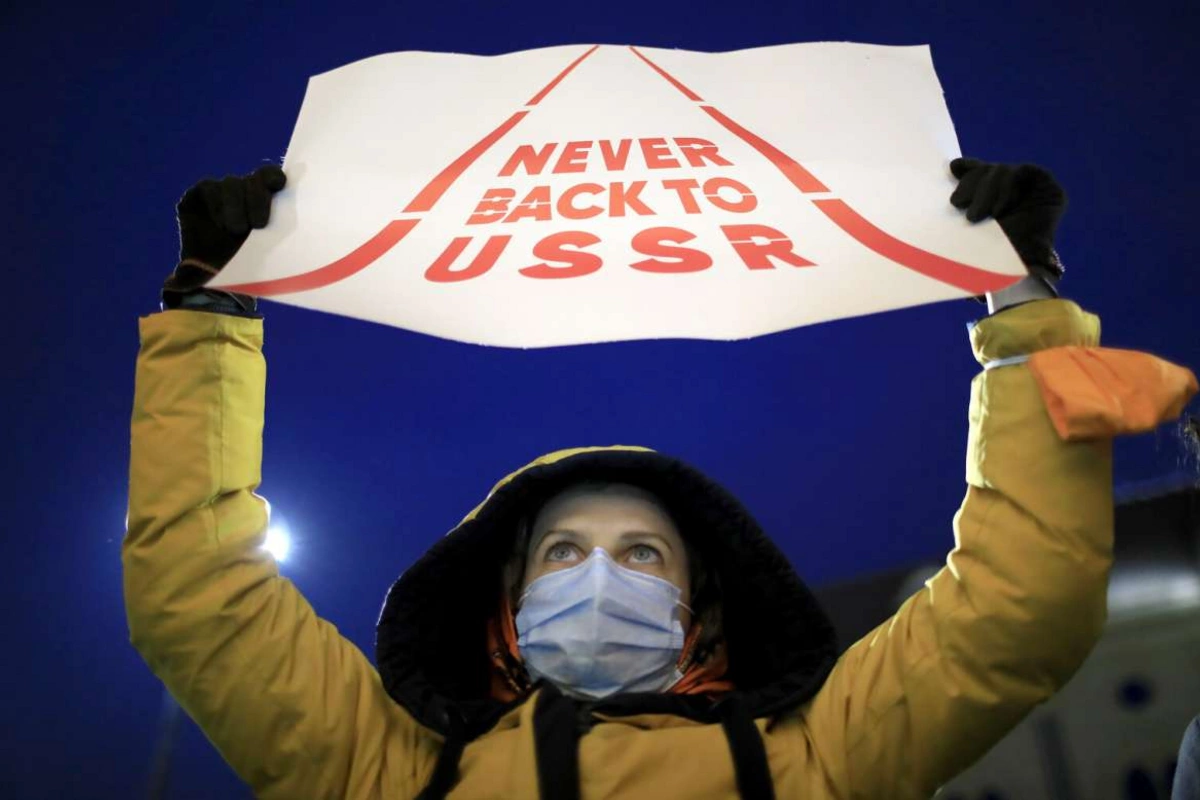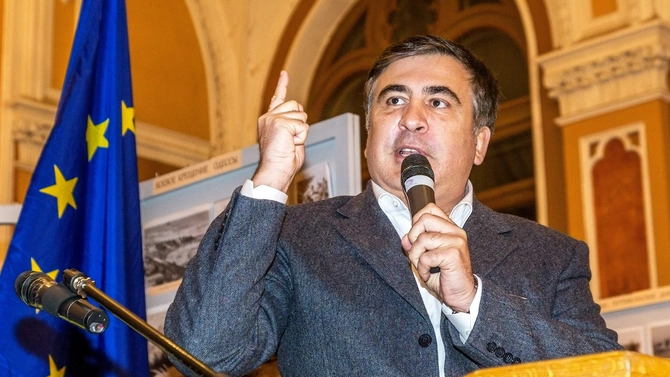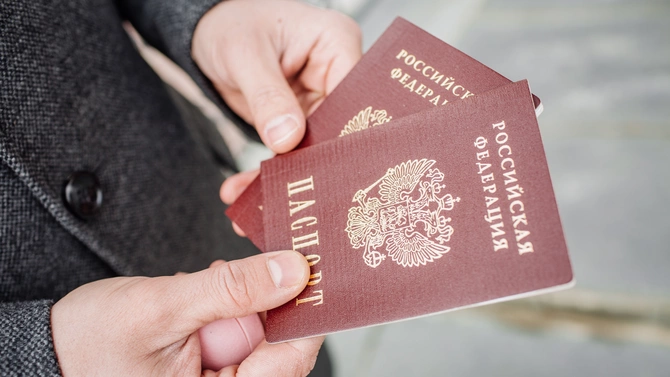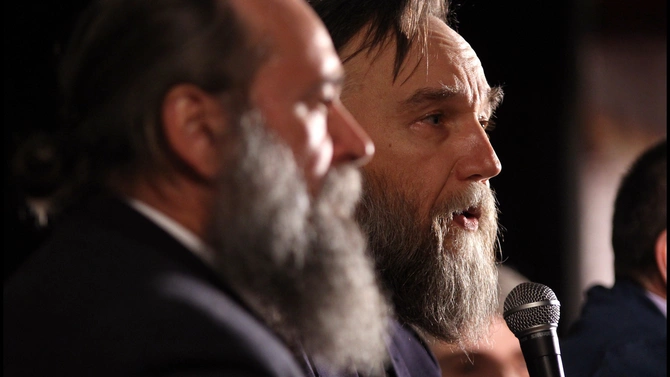
Political analyst Alexander Davitashvili takes stock of Russia's waning influence on Georgia: Moscow’s power plays, the branding of every party by the other as ‘pro-Russian’, and eastern Europe’s rising right wing.
TBILISI, GEORGIA – FEBRUARY 25, 2021: A woman participates in an opposition rally outside the Georgian Parliament building. David Mdzinarishvili/TASS.
In the second section of a two-part personal analysis, Alexander Davitashvili continues his examination of the relationship between Georgia and Russia. You can find Part 1 here.
Georgia accepted Christianity as a major religion in the 4th century, a factor that would prove pivotal in the nation's development. Christianity united Georgia against invaders and was one of the main enticements to forming friendly relations with Russia, itself also built around Orthodox Christianity. Georgia was bordered by two Muslim Empires (Persian and Ottoman) so asking for help from its northern neighbour was the “least bad” option, even though Russia had had a history of violating Georgia’s trust. As they say: “desperate times call for desperate measures.” The relationship, often toxic, would last for more than 500 years, including 200 years of full-scale annexation. Today, even though diplomatic relations have formally been terminated, Russia still tries to maintain its influence in Georgia.
Russian political influence decreased in Georgia after the short war of 2008, despite de facto Russian occupation of around 20% of Georgian territory - or perhaps because of it. Still, Russia remains one of the main reasons for Georgia’s internal political polarization, but it is Georgian politicians themselves that continue to include Russia. The two most influential political groupings, the ruling Georgian Dream [GD] and main opposition United National Movement [UNM], both accuse one another of being pro-Russian. In reality, the claims seem implausible. Passionately pro-Western Mikheil Saakashvili founded the UNM. And in 2017, GD amended the constitution to enshrine a policy towards integration with the EU and NATO.[1] Indeed, during the last four general elections, only one firmly pro-Russian party ever performed well enough to win any seats in parliament, and it remains a minor force[2].

Mikheil Saakashvili, founder of the Georgian UNM party is widely known to be pro-western. Image: A_Lesik/Shutterstock
In an April 2021 poll published by International Republican Institute, the overwhelming majority of interviewees stated that they perceived Russia as the main threat to Georgia both politically (88%) and economically (78%). Contrastingly, both the US and EU are considered trustworthy partners politically (69% and 54% respectively), if less so economically (55% and 39%).
So it’s no secret that Georgian society sees Russia as a significant threat. Thus the passing of ‘pro-Russia’ blame between the two main parties should be seen as a populist ploy – each trying to earn votes by unmasking the other’s supposed pro-Russianness.
It is no exaggeration to say that Russia has lost Georgia politically, and it seems impossible for Moscow to expect any substantive support from either citizens or the major political parties. In this respect, Georgia is very different from Ukraine, whose president, Volodymyr Zelensky, has criticized the many eastern Ukrainians who feel like Russians themselves, telling them to leave the Donbas and find a place to live in Russia.
So this begs the geopolitical question: what’s the next move for Russia? How will Russia try to maintain an influence over such an anti-Russian Georgia? The answer is not immediately obvious, but one place to look within the realm of International Relations theory might be the concept of “smart power.” That’s a mix of hard and soft power, uniting strong military action with cultural-economic partnerships and alliances to create a networked web of political influence.
Assuming that’s the strategy, let’s break down the strands of Russian policy into soft ‘carrots’ and hard ‘sticks.’
In terms of hard power, Russia uses three main techniques.
The first is known to IR scholars as borderization. Russian aggression and occupation of Georgia did not stop with the 2008 war. As well as propping up the breakaway Georgian regions of Abkhazia and South Ossetia as de facto states, Russian “peacekeepers” along with the de-facto authorities, have set up barbed-wire fences along the Administrative Boundary Lines [ABLs] (as the de facto frontiers with the breakaway regions are officially called in Georgian). These are not entirely static. Especially in the region of South Ossetia, when Russia is displeased by political decisions in Tbilisi, the fence is often shifted a little further into Georgia. Not enough to start a war, but enough to cause concern. This punitive ‘borderization’ creates a “creeping occupation.”

The Russian government handed out many thousands of Russian passports in the de facto states of Abkhazia and South Ossetia in 2002. Image: PRESSLAB/Shutterstock
The second Russian policy is often called passportization. Locals from the occupied regions typically refuse to use Georgian passports. Neither, however, can they use “Abkhazian” or “South Ossetian” passports due to the lack of widespread international recognition of the breakaway states. So the breakaway governments have welcomed Moscow’s offer to give Abkhazians and Ossetians Russian passports. According to Radio Freedom/Radio Liberty data, by 2019, 95% of locals from the Tskhinvali Region (South Ossetia’s main city) had already accepted Russian citizenship.
The third policy of Russian hard power is the abduction of people from Georgian-controlled territories. Reports from the Administrative Boundary Line suggest that Georgian citizens have been taken to detention facilities for supposed cross-border trespassing into the de-facto republics almost every day. Some have been detained just meters from their own gardens. In most cases, people are returned rapidly after paying fines, but these ‘border systems’ impositions on Georgian land are a major headache and tend to demoralize affected communities. Some cases are more serious, including at least two deaths. Since 2018 the Government of Georgia has been maintaining a register of individuals from Abkhazia and South Ossetia who have been convicted or charged with grave crimes committed against ethnic Georgians. This “Tatunashvili-Otkhozoria” list is named for the two victims who paid with their lives.
Russian soft power in Georgia is complicated by the fact that, for several years, the countries haven’t had diplomatic relations. Currently, the Embassies of Switzerland in Tbilisi and Moscow implement the countries’ consular affairs. Nonetheless, Russia uses a range of tools to exert its (decreasing) influence on Georgia, including trade/economic relations, agents of influence, and morality.
Politically the most challenging are agents of influence and so-called “useful idiots.” In the post-Cold War era, Russia turned from communism to the idea of “Moscow – the Third Rome.” Seeing itself as the standard-bearer of Orthodox Christian values, Russia shies away from Western interpretations of democracy and human rights. One of the founders of contemporary Russian ideology is Aleksandr Dugin, who proclaims that liberalism is the primary enemy of tradition and drives cracks into homogenous societies that maintain national values.

Alexandr Dugin, a Russian political analyst, strategist, writer and philosopher, is a significant influence on the political far-right in Georgia, though most who follow his ideas overlook his Russian passport. Image: LCV/Shutterstock
Dugin argues that a robust neo-Eurasian ideology within the leadership of Russia is necessary and inevitable. His “Manifesto of the Global Revolutionary Alliance” outlines principles, strategies, and programs, calling for “the dissatisfied of the world to unite.” The manifesto imagines that the world is dealing with the end of a historical cycle, an intolerable situation blamed on Western liberal ideology that is destroying any form of social, cultural, or religious solidarity. Dugin writes that “…the world we live in is unacceptable, intolerable, and leading to our inevitable civilizational suicide.” His proposed solution is to oppose liberal values and help Russia survive as a relatively ‘homogenous’ society. This might seem tongue in cheek in a state as multicultural as the Russian Federation, but Dugin continues: “A normal society is one in which peoples, nations and states are preserved as traditional forms of human community — as created forms, created by history and tradition.”
Despite the lack of appeal of Russia, per se, ideas like those of Dugin’s are nonetheless becoming increasingly popular in Georgia. Here, radical, right-wing groups use almost his exact words to criticize Georgia’s European and Euro-Atlantic integration. For instance, the far-right analytical media platform Alt-Info has started promoting alternative conservative values in the country. Notably, they were one of the organizers of anti-LGBTQ+ demonstrations in 2021, which resulted in the beating of dozens of journalists during the events of Tbilisi Pride.
Dissatisfaction against the west has also been stirred in the wake of attempts by the European Union and US officials to help negotiate a political depolarisation process between Georgia’s political factions after the 2020 parliamentary elections. For some Dugin-style thinkers, this was interference, showing that global powers were trying to “strip sovereignty” from Georgia. Anti-European demonstrators showed their dissatisfaction by removing (and burning) the EU flag from the Parliament of Georgia, replacing it with the cross of Saint Nino as a symbol of traditional Georgian-Christian society. The majority, they feel, does not want sexual minorities to dictate Georgia’s political agenda, seeing threats to the social, historical and cultural structure of the country, which – again – is portrayed as ‘homogenous.’
Visible political movements supporting and promoting Dugin’s ideology here include Georgian March and ERI (aka ‘Nation’), which have coordinated actions with each other and protest rallies since 2013 (albeit under changing names). It is worth noting that, despite invoking many of Dugin’s core ideas, these factions avoid any association with the Russianness of their mentor. Instead, they push the term “pro-Georgian conservative,” though their conservatism is far from a classical understanding of conservatism or even neo-conservatism. Unfortunately, some Orthodox clergy are coming under the influence of this ideology. It is primarily based on creating a feeling of victimization for the majority while disparaging minority rights. Non-traditional lifestyles, they fear, could lose people their “Georgian-ness.” It’s the most effortless trigger for Georgians, who, to avoid difficult choices on rights, fall back on the popular expression: “whatever you want to do, do it at home.”
Let’s not be too despondent. Overall far-right movements have relatively minimal political power. Georgian March took only 0.25% at the 2020 parliamentary elections. In the forthcoming local elections, ERI is not expected to reach the 2.5% minimum threshold for representation. However, damage is already being done. Despite failed political campaigns, the propaganda introduces cracks to social cohesion, and the apparent impunity of far-right actors is another element in Georgia’s ongoing political polarization.
The degree to which this is actively stoked by Russia is impossible to quantify. But it’s hard not to see the hand of Moscow in the self-defeating paralysis which currently afflicts the nation’s politics. If we are looking for signs of ‘smart power’ projection from the Kremlin, it would certainly seem to make sense as part of the mix.
[1] Article 78 states: “The constitutional bodies shall take all measures within the scope of their competences to ensure the full integration of Georgia into the European Union and the North Atlantic Treaty Organization.”
[2] The Alliance of Patriots, which received 5% of the vote in 2016, 3% in 2020.
Share on social media